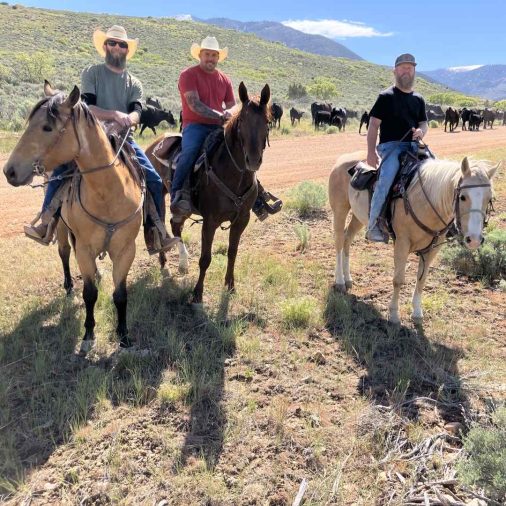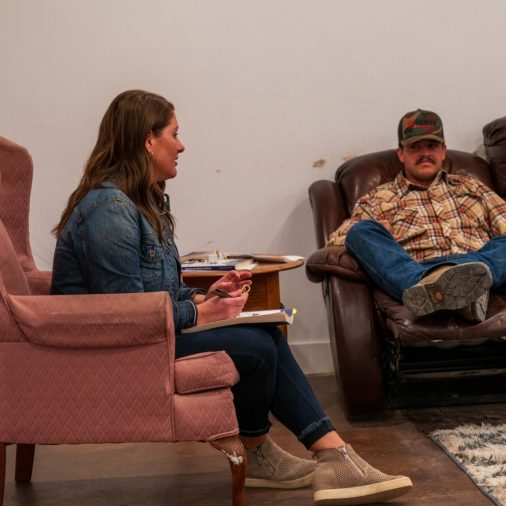LSD Addiction Treatment Utah
What is LSD Addiction?
Lysergic acid diethylamide (LSD), also known as “acid,” is a powerful hallucinogenic drug that alters perception, mood, and cognition. Although it is not considered physically addictive like opioids or stimulants, it can lead to psychological dependence and harmful patterns of use.
Repeated use of LSD can impact decision-making, increase the risk of psychosis, and lead to serious mental health challenges.
At Mountain Valley, our treatment for LSD addiction focuses on breaking the cycle of psychological reliance through comprehensive therapy, education, and life-skill development in a structured, supportive setting.
EXCELLENTTrustindex verifies that the original source of the review is Google. After several rehabs, and we mean several, our son recently hit the 1 year sober mark. We have our son back and are so grateful. Changing patterns, building healthy habits, developing a good work ethic and finding enjoyment in working, finding confidence, becoming responsible, developing good daily patterns, building good friendships, finding a place in the community,… takes time. Kellie and other staff members at Mountain Valley understand that and do a great job of supporting and guiding the residents in their daily walk. They build friendships with the residents. They show them respect and acceptance and recognize their great potential. They help them recognize that potential by giving them those daily opportunities to work, grow, contribute,… The therapists, also a key part of the program, are excellent. The community is also welcoming, kind, supportive, accepting,… and show friendship. Mountain Valley is what a recovery program truly needs to be in helping residents build a healthy lifestyle pattern. Thank you Kellie and the rest of the staff. So grateful to have our son back. We highly recommend Mountain Valley!!!Trustindex verifies that the original source of the review is Google. It’s hard to accurately put into words how amazing I think Mountain Valley Recovery is….. But I’m going to do my best. I have spent most of my adult life going from one treatment center to the next and from jail to jail. I have put my heart into recovery before and attended other treatment centers but in the end when I left treatment there were to many things missing and inevitably I relapsed. I was lacking good long term habits. I hadn’t built a work ethic because in all my previous treatment centers we just did therapy or rec therapy all day! Also there several other things that are essential for a fulfilling life that other treatment centers just couldn’t offer. I believe Mountain Valley has beautifully and elegantly found the solution for the deficiencies found in other programs. It is long term and allows you to build healthy habits that are permanent. They offer work with amazing caring people in the community. They offer weekly equine therapy. There are cows and horses on the premises that can be interacted with daily. They offer top notch therapy with excellent therapists. They offer recreational activities from skiing to cabin trips. The staff is compassionate, competent and invested in the success of their residents. They offer independence and responsibility. They allow you to save money and chart your own path with excellent support and guidance to make sure you are where you want to be when you graduate. It is a small town and everybody in the community is 100% behind all the residents. Most of all they offer all there residents a new home. By the time you graduate you feel such a part of the community that it seems almost impossible to leave. And if you to stay after graduation. They are right there to help you stay and put roots down In the community. It is not an easy program but every graduate I have met lead happy stable lives and are forever a part of the community. And for someone who hasn’t felt like I had a real home for a long time that is priceless. I would absolutely encourage anyone to consider what they want long term and understand that most of those things can’t be found in your typical rehabs. If you are ready to change and want to have the best chance of having a fulfilling life that you love. No other rehab can offer you more the Mountain Valley. I have found a home here in Holden, Utah of all places and I don’t see myself leaving anytime soon.Trustindex verifies that the original source of the review is Google. This is a wonderful and well rounded treatment program. The staff is wonderful and the facilities are great. Beautiful setting away from town with farm and animals. I highly recommend Mountain Valley RecoveryTrustindex verifies that the original source of the review is Google. Mountain Valley truly changed our family member's life from darkness to light. His life was a total mess & he was depressed. Now he's thriving in a new job & has an amazing positive attitude. Excellent staff & community support.Trustindex verifies that the original source of the review is Google. After multiple attempts at other rehabs and other avenues, we found Mountain Valley Recovery. We were cautiously optimistic when we sent our son here since we’d been disappointed in the outcome so many times before but after completing their 9 month program, he is clean, sober and will tell you that he’s way happier than he’s ever been or ever thought he could be! The way in which they run this program is perfect. Getting in touch with nature, learning how to be a ranch hand, group and individual therapy, finding faith in God, being taught numerous career skills, going camping and on tons of fun adventures are just a few of the many wonderful things that make MVR the most well-rounded and successful recovery program we’ve been able to find. We will never be able to thank Judd, Kellie, Chet and Joseph enough for all they’ve done for our son. He is a changed man. We highly, highly recommend Mountain Valley Recovery!Trustindex verifies that the original source of the review is Google. This place will get you where you want to be in life. MVR is a lifesaver. It is a very good tough program but this is the type of program that actually works. No one ever said it would be easy, it’s just worth it! Everything is one day at a time here. They build you up to become a part of society again. All of the employees at MVR are selfless and want nothing but the best for their clients. This place will not only get you sober, it will give you your life back. I wouldn’t recommend any other place to anyone. Judd and Kelly are so caring and will welcome you to their family the second they meet you.if you like therapy from horseback, 11,000 feet up in the mountains then this is the place for you! You will go on unbelievable adventures with Chet and other clients. Chet is an amazing therapist! This place is worth it! God bless!Trustindex verifies that the original source of the review is Google. I’ve spent the last year at MVR and words can’t express how grateful I am to everyone at the ranch. There are so many things that set mountain valley apart from other places it’s like no other recovery program ive ever been to. It’s changed my life and I feel blessed to have been able to build such a huge structure of fantastic people that I consider family. Much loveTrustindex verifies that the original source of the review is Google. Words and stars are not enough to convey how truly grateful our family is for the lifesaving and life-changing experiences our son had during his time at MVR. I can think of no better environment for someone to begin the difficult process of healing from the physical, emotional, and spiritual wounds of addiction. The support our son received from the owners, staff, and members of the local community was amazing. They truly care about the men who enter the program. If anyone reading this is struggling with addiction or has a family member struggling with addiction, I wholeheartedly encourage you contact Mountain Valley Recovery.Trustindex verifies that the original source of the review is Google. If I could give more stars, I would. My family and I are so grateful for the opportunity you gave my son to be his best self. I cannot thank you, the staff and community enough for everything you’ve given him. No doubts at all about how much you all truly care about the men who come to stay at the Ranch…. It’s life changing!Trustindex verifies that the original source of the review is Google. This program is not for the faint of heart. It is difficult, however you get out what you put into it. I was in bad shape when I got there. They were kind enough to accommodate my health issues I had when I arrived, other programs turned me down. The longer I was sober the better my health got. I'm now once again a contributing member of society with a year sober.
Common Signs of LSD Abuse
Recognizing signs of LSD abuse early is essential to getting the right help. While symptoms may vary between individuals, several common indicators can point to problematic LSD use:
- Persistent or frequent use of LSD despite negative consequences
- Intense or recurring hallucinations
- Mood swings, paranoia, or heightened anxiety
- Flashbacks or Hallucinogen Persisting Perception Disorder (HPPD)
- Disconnection from reality or distorted thinking
- Social withdrawal or unpredictable, erratic behavior
- Difficulty managing responsibilities at work, school, or home
If you or someone you care about is showing these LSD addiction symptoms, Mountain Valley Recovery provides compassionate, evidence-based treatment tailored to each individual’s unique needs and recovery goals.
What to Expect in Our Inpatient Treatment for LSD Addiction
Our LSD addiction treatment program involves several key stages:
- Rehabilitation: Our treatment for LSD addiction includes individual, group therapy, cognitive-behavioral therapy (CBT), and family therapy. We also treat co-occurring mental health conditions and help clients rebuild relationships affected by substance use.
- Treatment Duration: Program length varies depending on individual needs, ranging from several weeks to months. We offer a specialized Long-Term Residential Treatment Program for young adult men battling LSD addiction.
- Holistic Approaches: Our whole-person approach includes Vocational Programs, Recreation Programs, Faith-Based Programs, and other holistic therapies to promote emotional healing and long-term recovery.
- Aftercare & Relapse Prevention: After treatment, we support clients with individualized aftercare plans, relapse prevention strategies, and resources to sustain long-term sobriety.
Our Approach to LSD Addiction Treatment
At Mountain Valley Recovery, our approach combines clinical excellence with real-life recovery tools. Our men-only program, located on a fully operational ranch in Holden, Utah, offers a unique environment to heal, grow, and rebuild. We use a blend of traditional therapy and experiential learning-including equine therapy-to foster confidence, accountability, and emotional resilience.
By focusing on structure, responsibility, and connection, we help our clients overcome addiction and reclaim their futures.
FAQ About Our LSD Addiction Treatment
Can LSD cause long-term mental health issues?
Yes, prolonged LSD use can increase the risk of lasting mental health effects, even after the substance has left the body. Individuals may experience persistent anxiety, depression, paranoia, or a condition known as Hallucinogen Persisting Perception Disorder (HPPD), which involves recurring visual disturbances. These issues may require ongoing mental health support as part of a comprehensive treatment plan. At Mountain Valley Recovery, we incorporate dual diagnosis care to address both substance use and co-occurring mental health conditions.
Is medical detox necessary for LSD addiction?
Unlike substances such as opioids or alcohol, LSD does not typically cause physical dependence, so a traditional medical detox may not be required. However, psychological symptoms and emotional instability can occur during LSD withdrawal. Our clinical team provides 24/7 support in a structured environment to help individuals safely manage LSD withdrawal symptoms and stabilize during the early stages of recovery. This foundational support is key to long-term success.
How is LSD addiction different from other types of addiction?
LSD addiction is primarily psychological rather than physical. While it may not lead to classic physical withdrawal symptoms, users can develop a strong emotional or mental reliance on the drug. This makes behavioral therapies and holistic interventions especially important in treatment. At Mountain Valley Recovery, we focus on helping clients reshape thought patterns, build emotional resilience, and develop healthy coping strategies.
What age group is most at risk for LSD addiction?
Young adults and teenagers are most commonly affected by LSD abuse, often due to curiosity, peer pressure, or the misconception that hallucinogens are “safe” or non-addictive. This age group is particularly vulnerable to the psychological effects of LSD, including identity confusion, mood instability, and impaired decision-making. Our program is designed specifically for young adult men, offering age-appropriate care and guidance during this critical stage of life.
Substance Abuse Treatment Programs
Alcohol Addiction Treatment
Alcohol recovery starts today. With our personalized treatment and support, you can rebuild your life and embrace a healthier tomorrow.
Heroin Addiction Treatment
Heroin addiction can feel overwhelming, but recovery is possible. With our expert care, you can heal, rebuild, and reclaim your future.
Fentanyl Addiction Treatment
Fentanyl addiction can be overcome with the right support. Our evidence-based treatments help you break free and regain your strength.
Cocaine Addiction Treatment
Cocaine recovery starts with one step. With our expert care and support, you can break free and create a future full of possibilities.
Meth Addiction Treatment
Meth dependence doesn’t have to hold you back. Our evidence-based treatments help you rebuild a healthy, thriving future.
Opioids Addiction Treatment
Opioid recovery opens the door to a new beginning. Let us help you leave addiction behind and embrace a brighter future.
Xanax Addiction Treatment
Overcoming Xanax addiction is possible. Let our team help you regain your mental clarity and take back control of your future.
Amphetamine Addiction Treatment
Overcoming amphetamine addiction is possible. Let our team support you in restoring clarity and taking back control of your future.
Hallucinogens Addiction Treatment
Breaking free from hallucinogen addiction is possible. Our team is here to help you regain clarity and reclaim control of your future.
Ativan Addiction Treatment
Overcoming ativan addiction is within reach. Let our team help you find clarity, stability, and regain control of your future.
LSD Addiction Treatment
Benzodiazepine Addiction Treatment
MDMA Addiction Treatment
With the right support, MDMA addiction can be overcome. Our evidence-based treatments empower you to heal and reclaim your life.
PCP Addiction Treatment
Adderall Addiction Treatment
Adderall addiction doesn’t have to define your future. Our comprehensive treatment supports lasting recovery and personal growth.
Valium Addiction Treatment
Codeine Addiction Treatment
There’s life beyond Codeine addiction. With compassionate care and proven methods, we help you heal, grow, and take back control.
Morphine Addiction Treatment
Break free from Morphine addiction. Our compassionate team guides you toward recovery, growth, and a renewed sense of purpose.
Marijuana Addiction Treatment
Inhalant Addiction Treatment
Conquer Inhalant addiction. Our supportive team helps you rebuild, recover, and reclaim a healthier, more fulfilling life.
Painkiller Addiction Treatment
Percocet Addiction Treatment
Percocet addiction doesn’t have to control your future. Our tailored care supports lasting recovery and meaningful growth.
OxyContin Addiction Treatment
Kratom Addiction Treatment
K2 and Spice Addiction Treatment
Xylazine Addiction Treatment
CNS Depressants Addiction Treatment
Ketamine Addiction Treatment
Steroid Addiction Treatment
Galaxy Gas Addiction Treatment
Opiate Addiction Treatment








